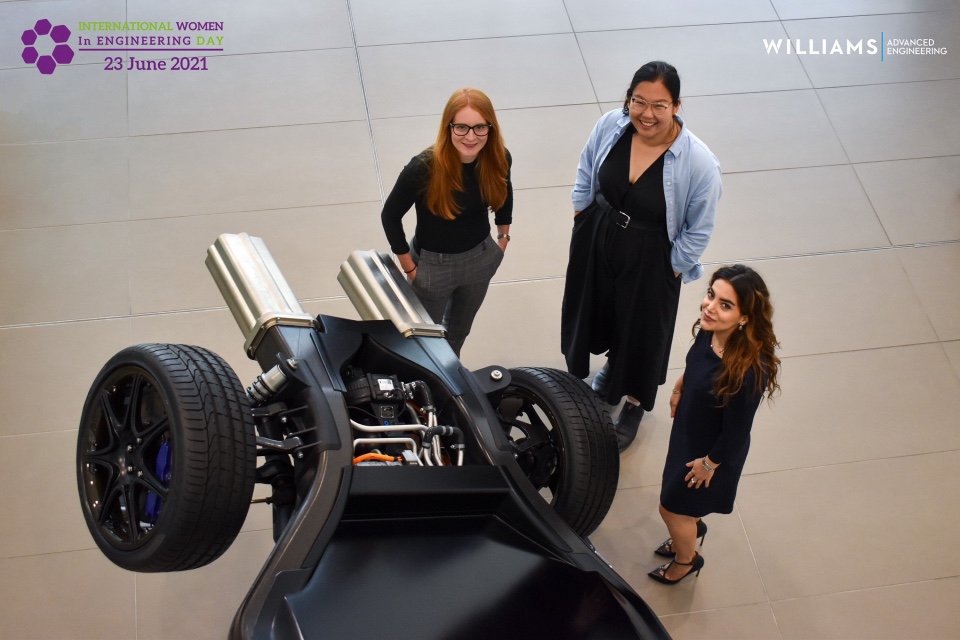International Women in Engineering Day (INWED): Q&A with the team at Williams Advanced Engineering
https://energymanagementsummit.co.uk/wp-content/uploads/2021/06/INWED-20211-2.jpg 960 640 Stuart O'Brien Stuart O'Brien https://secure.gravatar.com/avatar/81af0597d5c9bfe2231f1397b411745a?s=96&d=mm&r=gWith women currently making up less than 10% of the engineering sector in the UK, International Women in Engineering Day (INWED), taking place on June 23rd, provides an opportunity to raise the profile of female engineers, demonstrating a commitment to diversity and inspiring future generations.
We celebrate INWED by speaking to the team of female engineers from the Advanced Battery Team at Williams Advanced Engineering – Dr. Nasrin Shahed Khah (Senior Battery Systems Engineer), Melissa He (Battery Systems Engineer) and Rachel Lear (Battery Systems Engineer) – to learn more about what they do and what inspired them to pursue a career in engineering…
- Give us an insight into what you do at WAE?
NS: I’m a Senior Engineer in the Advanced Programmes team. Our team develops WAE’s battery capability, which includes everything from cell selection to testing and optimisation; ensuring we’re meeting the client’s requirements with our battery systems.
MH: I currently work for WAE as a Battery Systems Engineer in the Advanced Battery Concepts group where our role is to expand the limits of battery technology through the development of smarter battery architectures and control systems.
RL: I’ve been at WAE for approximately a month now, working as a Battery Systems Engineer. I spend a lot of my time focusing on different aspects of battery development activities; but primarily with cell testing requirements.
- What made you choose WAE as the next step in your career?
NS: My background is Mechanical Engineering from Imperial College. I had always held aspirations to become a Mechanical Engineer whilst growing up as I was good at physics and maths. My third-year project at Imperial College was based on fuel cells and that introduced me to battery technologies. At the time, in 2012, people were only just beginning to talk about electric vehicles with the introduction of the Nissan Leaf and Tesla vehicles. However, I found the challenges presented by electrification fascinating and enjoyed using new technologies to drive change. When it came to seeking employment, WAE was top of my list due to the advanced projects that the company were involved with. I wanted to be a part of a team at the forefront of battery technology within an exciting and knowledgeable group.
RL: I have previous experience in electrochemistry and cell development from my Chemistry degree at the University of Southampton as well as in my previous role. Moving to WAE as the next step in my career allowed me to stay in battery development; a sector I find very exciting and relevant, and at the same time broaden my knowledge and skills of this industry by working more closely with commercial projects.
MH: There were a few things that got me into the company but mostly, it was my desire to work on progressive and cutting-edge projects, especially in motorsport. Before coming to the UK, I remember going on the WAE website and seeing the Gen1 Formula E battery and thinking, maybe I could get a job working for WAE. I feel fortunate to be in a position now where I’m now working in a company where I can combine my background in chemistry with mechanical and motorsport engineering.
- Prior to your career in engineering, as a female, what was your perception of the industry compared to what it is now?
RL: I come from a scientific background and during my degree there was a relatively good ratio of male-to-female students. I had female friends who were engineers, but most were in a minority on their courses which is why engineering is probably still perceived as a very male dominated career choice. Despite the headline statistics, I would say, don’t let that put you off pursuing engineering as a career. I work in a team where we have a 50/50 split of male-to-female, which is great and regardless of gender, the important thing is the way in which you work together to deliver successful projects. If you have the required skills, there’s no reason why you shouldn’t be applying for any job. Personally, I’ve always been welcomed into teams and whilst women might be a minority now, as more of us study engineering, so more women will become engineers!
- Do you feel you’re a role model for the next generation?
NS: I hope so! All the members within our team are very driven and passionate about what we do and more importantly, love our jobs. When I joined in February 2019, I was the first female within the team, and my manager supported me, grew my confidence and helped me achieve my goals and progress within the team. I hope I can do the same for the next generation of engineers, whatever their gender!
- What advice would you give to any prospective female students looking to enter the industry or a similar role to you at WAE?
RL: I would say don’t worry if you don’t have a fixed career in mind. Be guided by the things you enjoy and by doing so, you’ll find it will lead you to the right career path. Electrification is a hot topic at the moment so there are lots of opportunities for careers in battery development.
NS: I think what got me here was determination and knowing what I wanted to achieve. Determination is key to being successful and achieving your goals. But I agree with Rachel, the most important thing is finding what you love, the thing you enjoy doing. Follow your passion, chase your dreams and it will happen. Never be afraid to ask questions. If you want to be an engineer, I’d say do it – all of our team love what we do.
- What’s the most exciting part of your job?
RL: Being at the cutting edge and forefront of so many new and emerging technologies. You get exposure to new ideas and solutions before anyone else and in doing so, get a vision for what the future might hold.
MH: I absolutely love problem solving and putting ideas into action. For example, if I have an idea, the business encourages me to discuss it and there’s never any judgement. Within the Battery Concepts Group, the philosophy is, let’s try it and see what happens!
- What’s a typical day in your job?
NS: Every day is different which I love. I could be doing anything from cell selection at early stages of battery programmes to overseeing module and battery pack activities from concept design to production refinement. I also support the safety elements of our current and upcoming battery projects at WAE. I really enjoy the variety of the work, whether I’m at my desk managing project delivery, or in the battery build facility overseeing practical work.
MH: My typical day is not really typical! Within such a small team, we cover a wide range of work and that’s one of the things that drew me to WAE; working on a number of different projects – from e-bikes and racing scooters to race cars and mining trucks!
- What was your inspiration for going into the industry in the first place?
RL: The battery industry has had a lot of media attention recently, so I think this made batteries an interesting area for me to explore. While I largely “fell” into the battery industry, the excitement of new electric vehicles and technologies makes me want to stay.
MH: For me, it was the technology. During my undergraduate studies , I participated in a competition to hybridise a Camaro and was hooked. Following experience in the automotive industry with electric vehicles and leading the work on an electric Formula Student car, I knew there were so many interesting problems left to solve.
NS: I have always grown up with a passion for cars and problem solving and so I wanted a career where I could combine both. I believe we’re now at the cusp of a technology revolution with engineering at the forefront, which has allowed me follow my dream and do what I love.



